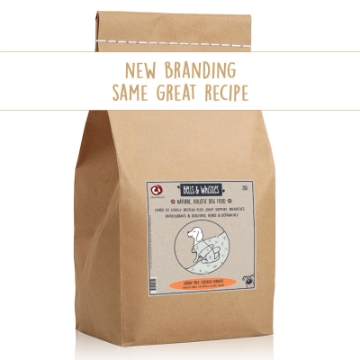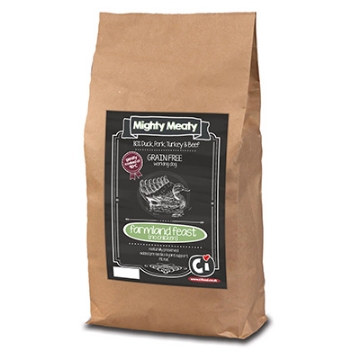Heart Health
Dog food for heart disease
As well as treating canine heart disease with medical interventions there’s also lots of evidence to suggest adapting your dog’s diet can be an important part of treatment.
Generally, the diet should be high in good quality, meat-based protein to maintain body mass & to provide the heart with much-needed amino acids (particularly taurine & l-carnitine). Taurine & l-carnitine supplementation is also an option, as is feeding mainly foods high in taurine (e.g. turkey, tuna & beef heart) & l-carnitine (beef & lamb).
In addition to protein, one of the most important things you can do is to ensure your dog remains a healthy weight.
Being either overweight or underweight (often called cardiac cachexia or muscle wasting) is not good for your dog’s health in general, but particularly when they have been diagnosed with heart disease.
Lower calorie foods with a very high protein content are difficult to create because meat and fat (which is high in calories) tend to go hand in hand. It is always better to deal with the weight issue (& supplement taurine/l-carnitine separately), than feed a high meat (& high calorie) diet that won’t shift the extra pounds. So, while you’re trying to slim your dog down, stick with a food that’s 9% fat or less. The lower fat/calorie foods listed here have been selected for their relatively high protein content considering their calories.
Another important factor is to keep salt intake as low as possible because dogs with heart disease have a reduced ability to excrete salt into their urine, which can lead to fluid retention.
High salt foods include ham, canned fish and cottage cheese along with table scraps and many ‘supermarket’ style dog treats.
Depending on how severe your dog’s illness is, sodium intake should either be moderately or extremely reduced. Feeding the no added salt dog foods below & removing any high-salt treats/scraps from your dog’s diet will help to reduce their sodium intake to a level that is acceptable for dogs on a moderate salt reduction plan, but for more extreme salt reduction a specially designed prescription diet may be necessary.
Omega-3 fatty acids which are present in fish & fish oils have also been shown to benefit dogs with heart disease & arrhythmias (abnormal heart rhythms), so the foods listed all have Omega 3 supplementation.
(Please be aware that we are not vets. The information given here is intended as a general guide & should not replace the directions received from your vet)
Mighty Meaty (original) Poultry & Fish
- Based around the principles of raw feeding, 80% meat/fish + 20% grain free veg etc.
- With added Joint Support, Omega 3 & healthful herbs & botanicals. Suitable for puppies too!
- Protein: 37%, Fat: 15%, Fibre: 3%, Calories: c. 374k/cal per 100g
- 1.5kg trial bag & 13kg sack (52kg bulk deal also available)
Mighty Meaty Fish Medley
- Based around the principles of raw feeding = 80% fish + grain free veg, herbs etc.
- Added Joint Support, healthful herbs & botanicals & packed with Omega 3. Suitable for puppies too!
- Protein: 35%, Fat: 20%, Fibre: 2%, Calories: c. 406k/cal per 100g
- 1.5kg trial bag & 13kg sack (52kg bulk deal also available) (52kg Bulk Deal Also Available)
Bells & Whistles Chicken Dinner
- Grain free & high in protein with added superfoods, joint support & healthful herbs
- Suitable for puppies & active adult dogs. Beet pulp free.
- Protein: 29%, Fat: 16%, Fibre: 3.2%, Calories: c. 371k/cal per 100g
- 2kg trial bag & 12kg sack (48kg bulk deal also available)
Bells & Whistles Chicken Dinner (Small Bite/Puppy)
- Grain free & high in protein with added superfoods, joint support & healthful herbs
- Smaller kibble size for small puppies or active adult dogs. Beet pulp free.
- Protein: 29%, Fat: 16%, Fibre: 3.2%, Calories: c. 371k/cal per 100g
- 2kg trial bag & 12kg sack (48kg bulk deal also available)
Bells & Whistles Duck Dinner
- Grain free & high in protein with added superfoods, joint support & healthful herbs
- Suitable for puppies & active adult dogs. Beet pulp free.
- Protein: 28%, Fat: 16%, Fibre: 3.2%, Calories: c. 371k/cal per 100g
- 2kg trial bag & 12kg sack (48kg bulk deal also available)
Bells & Whistles Lamb Dinner
- Grain free & high in protein with added superfoods, joint support & healthful herbs
- Suitable for puppies & active adult dogs. Beet pulp free.
- Protein: 29%, Fat: 16%, Fibre: 3.2%, Calories: c. 371k/cal per 100g
- 2kg trial bag & 12kg sack (48kg bulk deal also available)
Peptide Plus Gastro Care - NEW!
- * hydrolysed dog food that harnesses the power of peptides
- * proven 95% digestibility eases the workload on the gut
- * added postbiotics to support the gut & immune system
- * Protein: 25%, Fat: 15.5%, Phosphorus: 0.7%, Calories: c. 374k/cal per 100g
Happy Go Lightly (Turkey & Rice)
- Wheat & Gluten free, hypoallergenic low fat dog food that's gentle on kidneys & tums
- Ideal for low-moderately active dogs. Only 8% fat & 0.8% phosphorus
- Protein: 23%, Fat: 8%, Fibre: 3.5%, Calories: c. 346k/cal per 100g
- 1.5kg trial bag & 10kg sack (40kg bulk deal also available)
Mighty Meaty Farmland Feast
- Based around the principles of raw feeding - 80% meat (duck, pork, turkey & beef)
- With added Joint Support, Omega 3 & healthful herbs & botanicals. Suitable for puppies too!
- Protein: 38%, Fat: 19%, Fibre: 2.5%, Calories: c. 402k/cal per 100g
- 1.5kg trial bag & 13kg sack (52kg bulk deal also available)
Tickety Boo (Angus Beef, Sweet Potato & Carrot)
- Grain Free, super-gentle hypoallergenic recipe that's packed with protein.
- Ideal for dogs with sensitive stomachs. Only 0.5% phosphorus
- Protein: 29%, Fat: 13%, Fibre: 3%, Calories: c. 374k/cal per 100g
- 2kg trial bag & 13.5kg sacks (54kg bulk deal also available)
Tickety Boo (Lamb, Sweet Potato & Mint)
- Grain Free, super-gentle hypoallergenic recipe that's packed with 50% lamb.
- Ideal for fussy dogs & those with sensitive stomachs. Added Omega 3 supplement
- Protein: 26%, Fat: 13%, Fibre: 3%, Calories: c. 361k/cal per 100g
- 2kg trial bag & 13.5kg sacks (54kg bulk deal also available)
Tickety Boo (Tuna, Sweet Potato & Broccoli)
- Grain Free, super-gentle hypoallergenic recipe with a high Omega 3 content.
- Ideal for fussy dogs, arthritic dogs & those with sensitive stomachs.
- Protein: 26%, Fat: 14%, Fibre: 3%, Calories: c. 371k/cal per 100g
- 2kg trial bag & 13.5kg sacks (54kg bulk deal also available)
Tickety Boo (Turkey, Sweet Potato & Cranberry)
- Grain Free, super-gentle hypoallergenic recipe that's packed with 50% turkey.
- A great all-rounder that's ideal for dogs with sensitive stomachs. Added Omega 3 supplement
- Protein: 26%, Fat: 11%, Fibre: 3%, Calories: c. 357k/cal per 100g
- 2kg trial bag & 13.5kg sacks (54kg bulk deal also available)
Tickety Boo Mighty Bites (Turkey, Sweet Potato & Cranberry)
- Grain Free, super-gentle, hypoallergenic recipe that's packed with 50% turkey.
- Designed to meet the needs of large & giant breeds including added joint support
- Protein: 29%, Fat: 13%, Fibre: 3%, Calories: c. 367k/cal per 100g
- 2kg trial bag & 13.5kg sacks (54kg bulk deal also available)
Tickety Boo Senior/Light (Turkey, Sweet Potato & Cranberry)
- Grain Free, super-gentle hypoallergenic recipe for optimum support for senior or overweight dogs.
- Added Omega 3, l-carnitine & Joint Support & only 9% fat.
- Protein: 27%, Fat: 9%, Fibre: 3.5%, Calories: c. 343k/cal per 100g
- 2kg trial bag & 13.5kg sacks (54kg bulk deal also available)
Tickety Boo Tiny Bites (Lamb, Sweet Potato & Mint)
- Grain Free, super-gentle hypoallergenic recipe that's packed with 50% lamb.
- A great one for very fussy and/or allergic small breed dogs - lots of Omega 3 for skin & coat health
- Protein: 26%, Fat: 14%, Fibre: 3%, Calories: c. 367k/cal per 100g
- 2kg compostable trial bags
















































